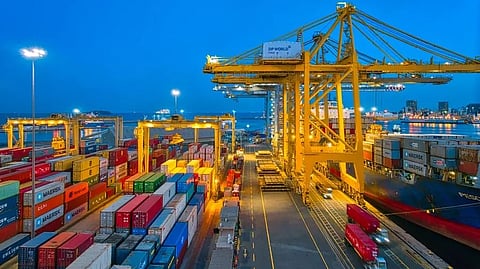AI is Key to Safeguarding Healthcare Supply Chains: Study
New research by Economist Impact and supported by DP World reveals that 46% of companies in the healthcare sector are using Artificial Intelligence (AI) to identify and address potential disruptions in their supply chains.
The latest Trade in Transition study, commissioned by DP World and led by Economist Impact, captured the perspectives of trade experts and senior executives across a variety of regions and sectors.
During a period of unprecedented transformation, heightened geopolitical risk, the urgent realities of climate change, and significant advancements in technologies are causing businesses to face complex challenges.
Yet there are also opportunities. New technologies instil confidence and optimism to increase efficiency and visibility across supply chains.
Shaping healthcare supply chain operations amid geopolitical events
The healthcare industry, faced with the challenges of geopolitical events, is embracing strategies like friendshoring to shape trade and supply chain operations.
A notable 39% of executives within the healthcare sector are actively rebuilding their supply chains with a focus on friendshoring in response to current geopolitical uncertainties.
FourKites New Generative AI Solution Helps Respond to Supply Chain Disruptions
In addition, 23% of companies are working with fewer suppliers regardless of location, reducing the number of tiers or links within the company’s most critical supply chains. These approaches underscore the industry's resilience and adaptability in navigating complex global dynamics.
The main reason for optimism when thinking about the future of global trade over the next two years is new technologies that increase the efficiency and visibility of supply chains, stated by more than a third of companies surveyed.
44% of healthcare companies are using AI to optimise customer experience while 35% for forecasting demand. AI has also helped reduce overall costs of trade operations for 34% of healthcare companies and enabled better resource, supply chain planning and reduced disruptions for another 32%.
Concerns over economic uncertainty and government sanctions
The research also highlights prevalent concerns within the healthcare sector, with 30% of companies expressing worry about increased inflation and economic uncertainty leading to higher input costs.
Additionally, more than a third (35%) of companies state that government sanctions on key trade partners hinder their supply chain strategies, emphasising the need for a comprehensive and adaptive approach to global trade in the healthcare industry.
Magrietha Mallinson, Global Vertical Lead, Health at DP World said: "In an era where unpredictability is the new constant, leveraging advanced technologies like AI is imperative.
"As production methods and pharmaceutical products continue to become more advanced, the industry must seek to innovate at every stage of the supply chain.
"DP World recognises the costs and complexity associated with building healthcare supplies and pharmaceutical products and is committed to providing innovative solutions that align with the evolving needs of the healthcare industry.
"Our solutions are designed to alleviate the challenges faced by businesses in moving healthcare supplies, allowing them to focus on their core mission of delivering quality healthcare to those in need."
Read More: Latest Trends in Aviation, Rail, and AI Focus on Sustainability: Parsons


